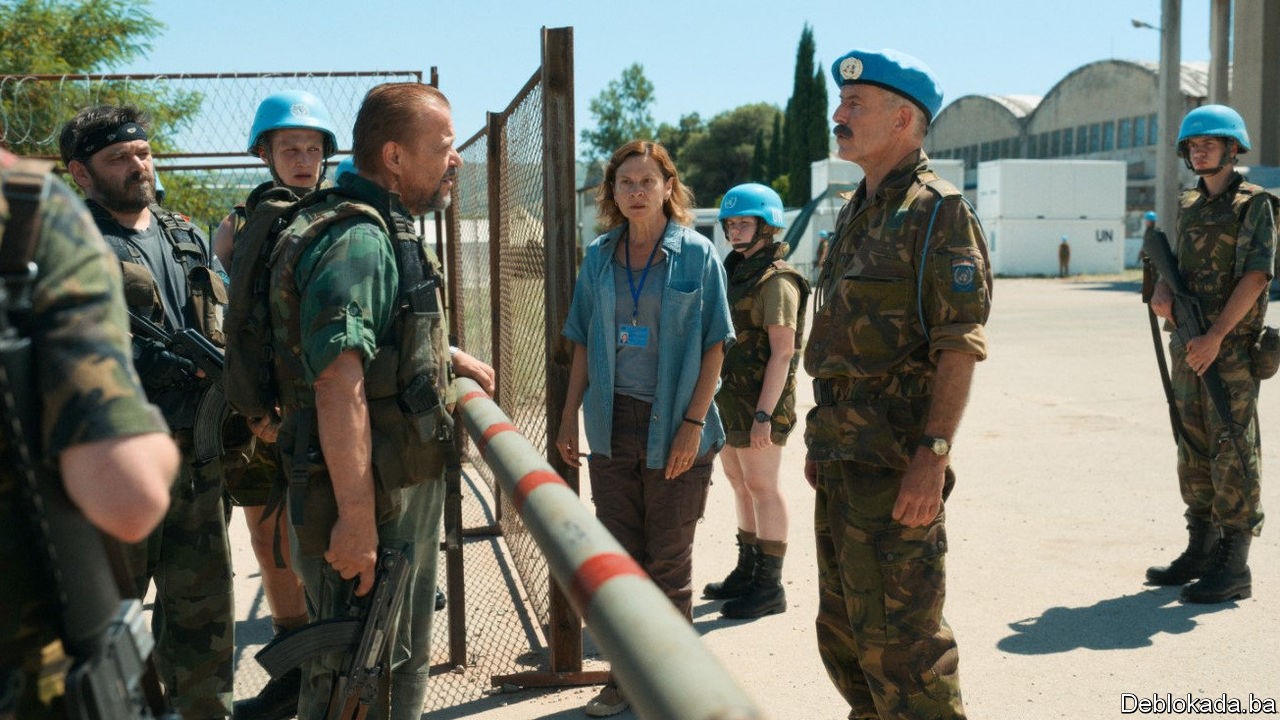
SINCE BOSNIA and Herzegovina’s film industry produces only a handful of films a year, it is hardly surprising that one of its latest should be the country’s entry to the Best International Feature Film category at the Academy Awards. Yet watch “Quo Vadis, Aida?” and it becomes clear why Variety, a Hollywood trade magazine, considers it a serious contender. Jasmila Zbanic, who writes and directs, tells the story of Aida, a UN translator in the doomed enclave of Srebrenica during the Bosnian war.
In 1995, at the end of the war, Bosnian Serb forces commanded by Ratko Mladic captured Srebrenica, defying the UN which had declared the town a “safe haven”. As Mr Mladic’s men rolled in, thousands of Bosniak (Muslim) inhabitants fled to a Dutch UN base in an old car-battery factory in search of safety. Several thousand managed to get inside before the Dutch soldiers closed the gates, leaving thousands more to camp outside. The Serbs soon separated the men and transported women and children to Bosniak-held territory on buses. As they were doing this, Bosnian Serbian soldiers began killing men and boys; within a few days some 8,000 had been murdered. Mr Mladic and several others were later convicted of genocide.
Ms Zbanic tells the story through the eyes of Aida, a fictional schoolteacher who works as an interpreter for the Dutch. As the refugees converge on the base, Aida manages to get her husband and sons inside. She is hopeful that she can save their lives and put them on a list of UN employees that will guarantee them protection, but that hope is slowly extinguished. It is clear what is going to happen, yet the drama and emotion never flag. The Dutch evict them from the base and they are murdered.
When Aida eventually returns home, she tells the Serb woman who is living in her flat to get out. She goes back to teaching. In a final scene she watches her pupils perform in front of their parents, victims and perpetrators, sitting together (as actually happens in Srebrenica today). Symbolically the children cover their eyes with their hands, uncover them, then cover them again.
The drama is compelling and telling this story is important. If the film wins an Oscar it may influence the way Srebrenica is remembered around the world. Ms Zbanic hopes it will counter denial of the atrocities: some Serbs either believe that the massacre in Srebrenica has been exaggerated or, worse, glorify what happened. Mladen Grujicic, the Serbian mayor of Srebrenica, denies that the murders were an act of genocide. As a result, Ms Zbanic and her production team decided it was too dangerous to film in the town and instead used the so-called Heliodrom camp in Mostar, where Bosniaks had been kept prisoner by Croats during the war. Many of its former inmates were among the film’s extras.
The biggest problem Ms Zbanic faced, however, was an age-old one: how to recount history and remain faithful to the facts while simultaneously making a drama that people want to watch, rather than a documentary. Though fictional, Aida’s tale is based on the real-life story of Hasan Nuhanovic, a translator for the UN in Srebrenica who wrote a book about what happened there. He later successfully sued the Dutch state for culpability in the deaths of his mother, father and brother, who were murdered after the Dutch compelled them to leave the base, in effect handing them over to Bosnian Serb soldiers.
In early versions of the script the protagonist was male. But Mr Nuhanovic disagreed with the film’s handling of some historical details; the character was changed as a result. “Where it really matters you cannot change the dialogues, you cannot change anything,” he says. “Of course this was a problem.” For her part, Ms Zbanic says that she has been very faithful to the facts and to “the essence of emotions”. She sought “to tell the truth in a way that people will understand it and care about it”. In the end, says Ms Zbanic, although Mr Nuhanovic’s book was an important source of inspiration, it was more natural for the central character to be a woman: “I understood that the ultimate pain of genocide was that of the mothers.”
“Quo Vadis, Aida?” is available to stream in Britain and Ireland from January 22nd via Curzon Home Cinema








